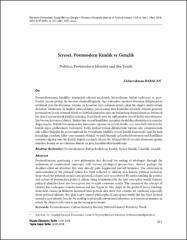| dc.contributor.author | Babacan, Abdurrahman | |
| dc.date.accessioned | 08.07.201910:49:13 | |
| dc.date.accessioned | 2019-07-08T20:18:39Z | |
| dc.date.available | 08.07.201910:49:13 | |
| dc.date.available | 2019-07-08T20:18:39Z | |
| dc.date.issued | 2018 | en_US |
| dc.identifier.citation | Abdurrahman B. (2018). Siyaset, postmodern kimlik ve gençlik. Marmara Üniversitesi Siyasal Bilimler Dergisi, 6(1), 211-228. | en_US |
| dc.identifier.uri | https://hdl.handle.net/20.500.12511/411 | |
| dc.description.abstract | Postmodernizmin kimlikler üzerindeki etkisini incelemek, küreselleşme, kültür endüstrisi ve post- Fordist yaşam pratiği ile beraber düşünüldüğünde, her bakımdan modern dönemin kalıplarından sıyrılarak yeni bir düşünme, yaşama ve hissetme tarzı şeklinde ortaya çıkan bir olguyu analiz etmek demektir. Modernite ile birlikte zaten oldukça parçalanmış olan kimlikler üzerinde etkisini gösteren postmodern felsefe, zihinsel, felsefi ve kültürel dönüşüm sürecini hızlandırıp derinleştirirken, bütüncül bir siyasal içerim olarak kimlik’e yansımış, buradan da yeni bir toplumsal ve siyasal kültür inşa olmuştur. İşte bu yeni kavramsal dünya, Türkiye’nin siyasal kimlikleri açısından da oldukça dönüştürücü sonuçlar doğurmuştur. Kimlik kavramının özü dönüşüme uğramış ve siyasal alanda, ucu-sonu belli olmayan bir kimlik algısı şekillenmeye başlamıştır. Farklı tarihsel zaman dilimlerinde yapılan saha çalışmalarında elde edilen bulgular da göstermektedir ki, vatandaşlar özellikle siyasal kimlik konusunda hem bir kafa karışıklığı yaşarken; fakat aynı zamanda bilinçli ve iradi biçimde geleneksel/konvansiyonel kimlikleri erozyona uğratıp yeni bir kimlik örgüsü etrafında oluşan bir zihinsel-felsefi kavram dünyasına girmiş olmakta, bunun en net yansıma alanını ise genç kuşaklar oluşturmaktadır. | en_US |
| dc.description.abstract | Postmodernism, producing a new philosophy that dictated the ending of ideologies through the realization of conjunctural marriages with various ideological perspectives, showed perhaps the deadliest effect on identities that were already quite fragmented and left homeless. The confusion in understanding of the political sphere has been reflected in identity as a holistic political inclusion, from which the political societies and political cultures have exacerbated. By understanding the politics and culture of postmodern political culture being transformed by the new conceptual world, Turkey’s political identities have also been given rise to quite converter results. The essence of the concept of identity has undergone transformation and has begun to take shape in the political arena. Findings from field studies in different historical time periods also show that citizens are confused, especially about political identity; but also, a new mental-philosophical conceptual world that has been formed around a new identity bracket by eroding traditional/conventional identities in a conscious manner, in which the clearest reflection is on the young generations. | en_US |
| dc.language.iso | tur | en_US |
| dc.rights | info:eu-repo/semantics/openAccess | en_US |
| dc.subject | Postmodernizm | en_US |
| dc.subject | Kültür Endüstrisi | en_US |
| dc.subject | Kimlik | en_US |
| dc.subject | Siyasal Kimlik | en_US |
| dc.subject | Görelilik | en_US |
| dc.subject | Gençlik | en_US |
| dc.subject | Postmodernism | en_US |
| dc.subject | Culture Industry | en_US |
| dc.subject | Identity | en_US |
| dc.subject | Political Identity | en_US |
| dc.subject | Relativity | en_US |
| dc.subject | Youth | en_US |
| dc.title | Siyaset, postmodern kimlik ve gençlik | en_US |
| dc.title.alternative | Politics, postmodern identity and the youth | en_US |
| dc.type | article | en_US |
| dc.relation.ispartof | Marmara Üniversitesi Siyasal Bilimler Dergisi | en_US |
| dc.department | İstanbul Medipol Üniversitesi, İnsan ve Toplum Bilimleri Fakültesi, Siyaset Bilimi ve Uluslararası İlişkiler Bölümü | en_US |
| dc.authorid | 0000-0003-4703-1085 | en_US |
| dc.identifier.volume | 6 | en_US |
| dc.identifier.issue | 1 | en_US |
| dc.identifier.startpage | 211 | en_US |
| dc.identifier.endpage | 228 | en_US |
| dc.relation.publicationcategory | Makale - Ulusal Hakemli Dergi - Kurum Öğretim Elemanı | en_US |


















